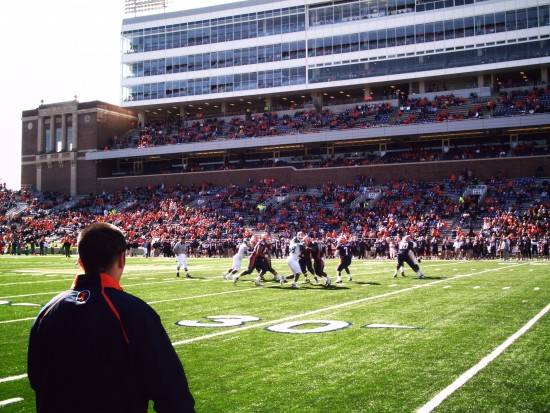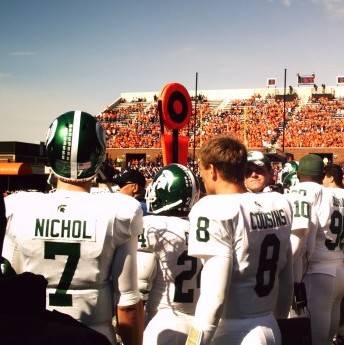 There were two plays in Illinois’ loss to Michigan State that capture perfectly the esteem in which this football team is held by others.
There were two plays in Illinois’ loss to Michigan State that capture perfectly the esteem in which this football team is held by others.
The first came midway through the first quarter. With the ball on the Illinois thirty-six, the Michigan State offense had a fourth down and three. Against most teams, the Spartans would have considered their options. A pooch punt might bury the Illini offense deep inside their own ten yard line. Or a very long field goal might be tried, at a point in the game when there was little pressure on the kicker to make it. But the cost/benefit analysis against the Illini is much different, so the Spartans never hesitated in taking a third option: trying to get the first down.
The potential downside of this decision — giving the Illini the ball with good field position — was of minor concern. Illinois hadn’t proven the ability to move the ball, regardless of where on the field they get it. Better still for the Spartans, the Illini defense hadn’t proven an ability to stop the run.
In short, Illinois scares no one on either side of the ball. The Illini offense averages positive yards only about one of every three downs. The defense seems to employ a “bend but don’t break policy,” which works right up until they get bent over into the end zone.
So the Spartans went for it. They got the first down and another four yards besides.

The second example came in the fourth quarter. It followed maybe the best Illinois play of the afternoon (which came, naturally, on a punt) when the Illini pinned the Spartans deep in their own territory. Michigan State was forced to start on their own one yard line, the worst position on the field.
With their heels in their own end zone, most teams opt for a running play that buys them a little breathing room and gets holding-prone lineman out of danger of getting a safety. Not Michigan State. A team that a few short weeks ago lost at home to Central Michigan decided to run a slow-developing pass play. Against most other teams this would be risky. Against Illinois it was completed for a first down.
Coach Ron Zook is not unmindful of his team’s reputation, so he decided to shake things up a little this week by replacing four year starter Juice Williams with his longtime backup Eddie McGee.
The talented, big-hearted McGee has not had very much luck in his Illini career. Spending his time spelling Williams after injuries or in the middle of particularly poor performances, McGee game has been plagued by turnovers. It started in the first game of the 2007 season, against Missouri, after Williams was knocked out. Illinois was driving and about to take the lead when McGee fumbled on the one yard line and a Missouri Tiger picked it up and ran it the other way for a touchdown.
The most recent time McGee came in to spell a struggling Juice Williams — two games ago, at Ohio State — he threw an interception on his first play.
On Saturday, McGee played fine. In front of a crowd that now measures success in first downs instead of touchdowns, McGee moved the ball well enough with the few opportunities he had. Certainly he played no worse than Juice Williams. Though Illinois didn’t score with McGee at quarterback, that had more to do with the fact that in thirty minutes of first half play, the Illini had the ball a little over eight minutes. During most of that time, McGee was scrambling.
Near the start of the third quarter, McGee threw a pass that was intercepted and returned for a touchdown. That made the score 24–0 and ended Coach Zook’s grand experiment. It had lasted a bit over ten minutes of game time. Juice Williams returned to the helm and eventually put up two scores against an MSU team happy to win by only ten.
But there is good news. With fewer people showing up to home games — and those that do leaving early — the post game traffic has been quite light.








